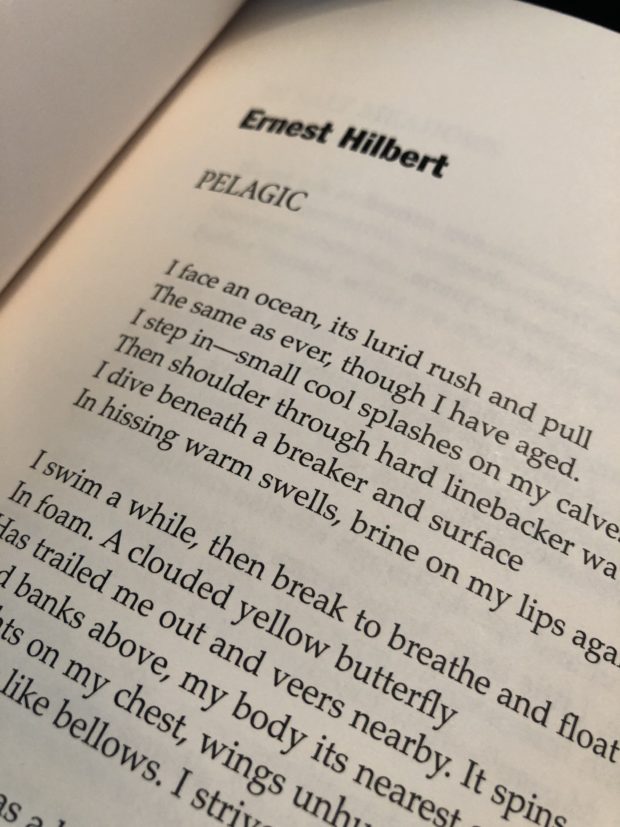My poem “Pelagic” (from a book-in-progress called Storm Swimmer) appears in the latest issue of The Hopkins Review (Volume 13, Number 2, Spring 2020, Johns Hopkins University Press).
I face an ocean, its lurid rush and pull
The same as ever, though I have aged.
I step in—small cool splashes on my calves—
Then shoulder through hard linebacker waves.
I dive beneath a breaker and surface
In hissing warm swells, brine on my lips again.
I swim a while, then break to breathe and float
In foam. A clouded yellow butterfly
Has trailed me out and veers nearby. It spins
And banks above, my body its nearest ground.
It lights on my chest, wings unhurriedly
Closing like bellows. I strive to stay still.
It’s off, fast as a blink, alive in the sun.
I spin over, face down in the lapping
Amber glass, the pelagic summer roll
Of original sea, the sandy glint
Of bubbles climbing in the goggle’s pane,
My arm swiping down in time like a fluke,
Mottled in swarming undersea light.
The breakers roll in to hide the beach from me.
I imagine I’m in a world only
Ocean and sky, four billion years ago
Or in a time to come, floating without
The earth to save me, as long as I might.
About the Hopkins Review: “This literary gem, the rebirth of a short-lived review from the mid-twentieth century, publishes the finest in contemporary letters. Featuring fiction, poetry, memoirs, essays on literature, drama, film, the visual arts, music and dance, The Hopkins Review has been called a ‘postmodern blend of intellectual heft and Vaudeville’ by Susan McCallum-Smith of WYPR and Urbanite magazine. Contributors include literary and scholarly heavyweights such as Max Apple, John Barth, Donald Barthelme, Millard Kaufman, Frank Kermode, and many others.”
” . . . the voice most characteristic of Mr. Hilbert’s work sounds something like a punk-rock Wordsworth, or a heavy-metal Milton, melding grandeur and the Grand Guignol, squalor and prophecy, in a kind of snarling sublime. In Caligulan, this voice fulfilled its potential: trash, noise, madness, death, and chaos create a kind of ambient howl, like a vortex within which characters flung hither and thither frantically try to make sense of their lives. The effect is at once uncanny and undeniably familiar. Reading Caligulan is something like walking the neighborhood while listening to the second movement of Shostakovich’s String Quartet No. 8 on repeat.” – The Hopkins Review



No Comments